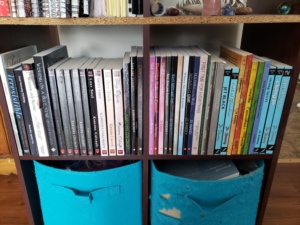I love writing books.

For several years, I couldn’t say that. Most of my life, writing was therapy for me. It was how I sorted out all the “how to human” questions I had as an undiagnosed neurodivergent person. It was how I explored gender and relationships during times when I couldn’t explore those in my own life. It was how I processed trauma, how I fixed things, how I tried to figure things out.
At some points in my life, it was literally how I stayed alive.
Then, in 2014ish, I started struggling. At that point, I was five years into being a published author. My books were selling poorly, and sales were getting worse all the time. Publishers were going out of business, in one case taking my rights to my books with them. (They allegedly sent me rights reversion notices for all the books; I never received those notices and my emails requesting that the notices be re-sent were ignored.) Publishers were doing… let’s say interesting mathematics when it came to calculating royalties.
I was struggling with the pace I’d set myself; I was writing both romance and young adult fiction, and I was so afraid readers would forget me if too much time passed that I was pushing myself to write a book or more every single month. But the idea well was running dry, and I was starting to get feedback and criticism about repetitious characters and plots. Which didn’t help my mental state or my view of my writing, which meant my writing suffered even more.
At this time, I was also dealing with some personal life/mental health stuff. Past trauma resurfaced along with the infliction of new trauma at the hands of someone I trusted. Since the trauma was sexual, I became unable to write sexual content–which was necessary content in my romances. It all culminated in my having such a massive panic attack while trying to write that I almost had to be hospitalized.
I stopped writing romances in 2015. My novel Dawn Over Dayfield–which was more romantic suspense than actual romance and included only one very brief sexual scene–was the last Karenna Colcroft thing I wrote before I gave up entirely on romance writing and tried to focus on my young adult books. But once Karenna Colcroft was put into hibernation, my YA writing started to suffer as well. My last YA novel (under the author name Jo Ramsey) was written in 2016 and published in 2017… and then I gave up entirely on writing. For the next several years, other than occasional blog posts and really long Facebook posts, I wrote nothing.
After a couple-few years, I started writing again. This time, I wrote nonfiction books connected to the channeling and mindset coaching business I was attempting to build (https://riverlightbearer.com). I enjoyed creating those books and started thinking maybe I could write *something* again.
In 2020, during the pandemic days of sitting at home with little to do, my partner and I were talking about the shortage of children’s fiction that includes accurate, positive depictions of pagan spirituality, alternative family structures, and other concepts. My partner looks after an elementary-school-aged girl; I have a grandson about the same age. I said to myself, “I’m a writer. Maybe I could write books for those two kids that have the concepts my partner and I talked about.” So I did. I wrote a series that currently numbers five books; it was supposed to be 8, but one of the plot points in book 6 gave me issues because it was too close to something that had just happened in my own life. But those five books did get written, and as with the nonfiction, I chose to self-publish them. (https://www.amazon.com/dp/B0BC4TVKZ3)
And then in 2021, when my younger kid was staying with me for the summer and I was trying to find ways to occupy myself without intruding into the space they were using while staying here, I started rereading some of my published books. For a few years, I’d bandied about the idea of rereleasing my Real Werewolves Don’t Eat Meat series, but I kept deciding not to. I didn’t want to do the work of editing the books. I didn’t think they would sell. I didn’t have time. I came up with a ton of reasons that all boiled down to the fact that I was still recovering/healing from the issues in 2014 and 2015, and I simply wasn’t ready to resurrect Karenna Colcroft and try writing again.
But in 2021, rereading those books, I thought, “Damn, these are GOOD! I was a good writer.” And I decided it was time for Kyle, Tobias, and their friends to see the light of day again. I even wrote three brand-new romance novels, one of which was published last year; the other two won’t be published because they are heterosexual romance, and I realized pretty quickly in 2022 that focusing on male/male romance both results in better connections with readers and other authors *and* is better for my mental health. (Though one of those other two novels will be scavenged to form the plot of Real Werewolves Don’t Eat Meat 7, and some components of the other are forming part of the framework and plot of A Fighting Chance, my current work-in-progress that’s a follow-up to Chance Met.)
And seeing that I was able to update and revise the RWDEM novels, that readers wanted them and that readers and authors from the “before times” remembered me and were happy to see me back, I started loving writing again.
Well… mostly. Sometimes the characters and plot points still give me angst, and don’t even get me started about writing the *blurbs*. But I am enjoying writing books again. And I’m excited to start sharing new things as well as rereleasing some of my favorites from my previously-published works.

